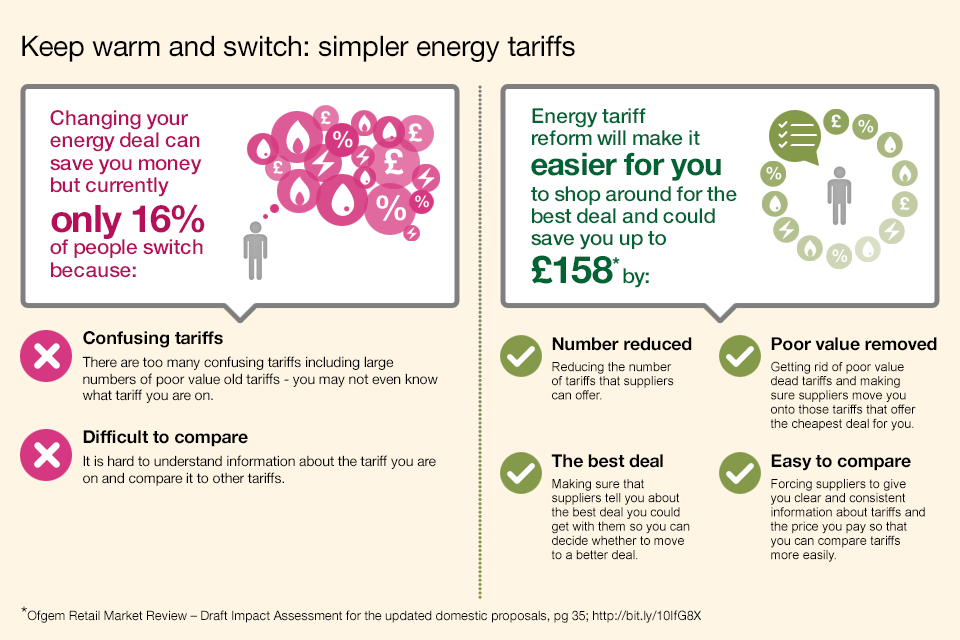“Turning non-switchers into savvy switchers” - Davey
The Government is taking additional steps to make sure the 84% of households who don’t switch can get the best deal

Press notice: 13/047
The Government is taking additional steps to make sure the 84% of households who don’t switch can get the best deal, Ed Davey announced today. Switching energy suppliers could save households as much as £158 a year but only 16% switched between March 2012 and March 2013.
This builds on Ofgem’s reforms to create a simpler, clearer and fairer market for energy consumers, which Government is backing through the Energy Bill. These reforms will move people off poor-value “dead” tariffs, reduce the number of core tariffs to four per gas and electricity supplier, and make bills easier to understand.
Publishing the Government’s response to the discussion document “Ensuring a better deal for energy consumers”, the Energy and Climate Change Secretary confirmed the Government’s backing for Ofgem’s market reforms and set out plans to:
- Ensure customers on uncompetitive legacy tariffs will be automatically moved to their supplier’s cheapest variable rate tariff. Of the estimated 650 “dead tariffs”, around a third could be poor value;
- Ensure customers who are on fixed deals will be automatically moved to their supplier’s cheapest variable rate tariff when their fixed deal ends;
- Make clear to all other customers what the cheapest deal is that suits their preferences (such as getting a green tariff, or a fixed term tariff) and give the opportunity to switch;
- Provide £900,000 to set up a new Big Energy Saving Network to co-ordinate and provide advice on switching, tariffs and government support to help the poorest get warmer homes and lower bills;
- Require energy suppliers to provide information to consumers in a format that would allow it to be read by an electronic device, such as a smart phone;
- Give powers to Ofgem to take action to protect against poor practice by switching sites; and
- Consider what more needs to be done to promote collective switching, which in two early schemes has shown average savings of £133 and £223 per household.
Mr Davey said:
“When consumers are feeling the pinch, it’s not right that 84% of households, including the most vulnerable, are put off switching or engaging in the energy market.
“Fundamental to overcoming this is Ofgem’s reform of the retail energy market. This will make the market simpler and fairer, and we’re using the Energy Bill to make sure these reforms are not delayed or frustrated.
“But we’ve got to do even more to put the best deals on a plate for people.
“This is why I’m announcing a new network of outreach by trusted organisations to help the most vulnerable in our communities. Trusted experts will provide meaningful, comprehensive advice on getting the best deal and support from government programmes.
“And I’m dragging energy bills into the 21st Century by requiring suppliers to include electronic information that will help millions compare and switch at the swipe of their smart phone.
“I want to turn the non-switchers into savvy switchers.”
Powers being taken in the Energy Bill will also give Ofgem the power to ensure that consumers can be directly compensated when energy suppliers break the rules.

Notes for editors:
- Read the Government response to the discussion document “Ensuring a better deal for energy consumers”
- Ofgem set out proposals to reform the retail energy market on 21 February 2013.
- The Government is using the Energy Bill legislate to ensure Ofgem is not frustrated or delayed in implementing its reforms of the domestic retail energy market.
- DECC’s latest public attitudes tracker (published on 30 April 2013) found that 16% of those surveyed switched energy supplier in the last year
- Figures from Ofgem suggest consumers can save an average of £72 and a possible maximum of £158 per year by switching to the cheapest deal in the market for their payment method.
- Members of the Big Energy Saving Network will be Citizen’s Advice Bureau, Energy Saving Trust, Age UK, ACRE (Action with Communities in Rural England) and NEA (National Energy Action)
- The Which? Big Switch collective switching scheme estimated saving around 37,000 participants an average of £223 per year. The first phase of Cornwall Together recorded average savings of £133.